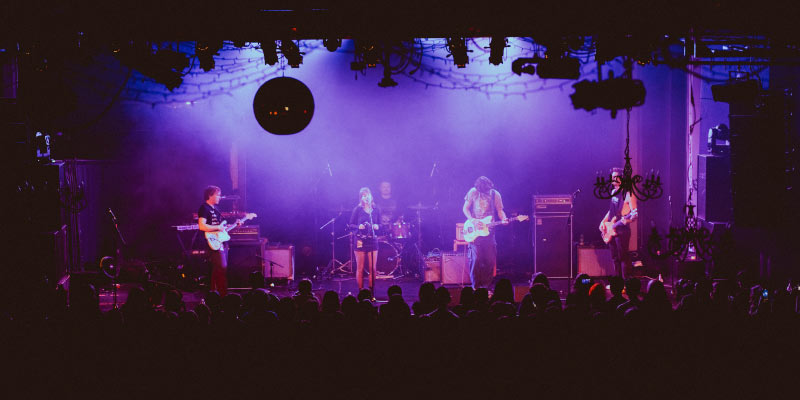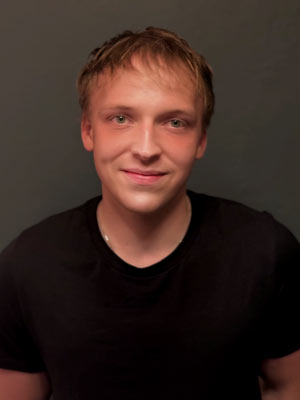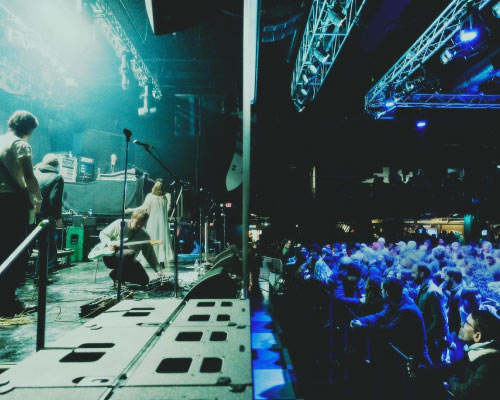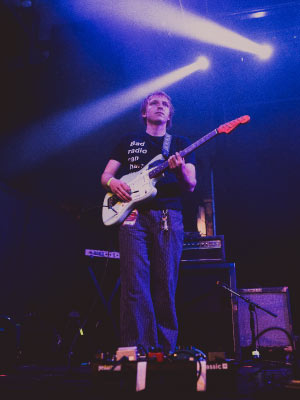
Raines Lucas is an undergraduate student at the University of Wisconsin – Madison, a guitarist in a touring band, and a GLUE researcher. No, not the glue that you’d use to mend a broken dish — the Global Land Use and Environment Lab, directed by Nelson Institute professor Holly Gibbs. Lucas, with a background in statistics, is working with other GLUE researchers to identify cropland expansion trends in the Midwest and beyond.
Lucas came to the UW to study mathematics and economics. “I’ve always really liked math. Specifically, I like mathematical modeling, or using statistics to model different scenarios, especially in human behavior,” says Lucas. But even though he knew what he liked to do, Lucas wasn’t quite sure how he would use those skills until after arriving on campus.

To Lucas, an environmental economics class and an introductory ecology class were both turning points in his academic career. “Those two classes helped me understand that the climate crisis isn’t just a carbon crisis, but also an ecological and ecosystem crisis,” he says. “It was eye-opening for me to understand what’s happening to our ecosystems, and the large-scale change they’ve seen in such a short amount of time.”
“I came to this university not really thinking about my role in an ecosystem — I saw them as things that we study, but not interact with,” says Lucas. “Since then, I’ve had a lot of wonderful professors that have helped me realize that I’m part of an ecosystem — we are all part of an ecosystem, and every action we take affects these ecosystems even if we don’t realize it. Learning this was a legitimate epiphany of mine, and it completely changed my career trajectory,” he says.
When he graduates this spring, Lucas’s diploma will still list his majors as math and economics, but he now knows his true passions lie in agricultural and ecological economics — interests that led him to the Global Land Use and Environment Lab (GLUE) during his sophomore year. GLUE’s research focuses on examining how humans use land around the world, studying the environmental impact of those uses, and determining which steps can be taken to negate harmful outcomes.
Inspired by Holly Gibbs and Tyler Lark’s research in cropland expansion (converting grasslands into croplands), Lucas joined the GLUE team as an undergraduate researcher to analyze trends in Midwest cropland expansion alongside Gibbs, Lark, and Christina Dennis, one of GLUE’s staff researchers. “My main research goal is to identify which properties are responsible for cropland expansion, what kinds of properties haven’t been expanding, and which properties are abandoning cropland,” says Lucas.

“It’s rare that one person is able to dictate land use changes over a massive area — it’s usually a large number of people with their own personal incentives,” says Lucas. “What’s really cool about GLUE is that we try to understand large-scale transformations, which is hard to do because there are so many variables involved.”
Working in the GLUE lab isn’t Lucas’s only research experience on campus; he is also part of the Climate Action Lab, run by Nelson Institute faculty affiliate Morgan Edwards. “I’ve gained so many skills from that lab that have allowed me to be more successful in GLUE,” says Lucas. “I love being part of both labs because even though they don’t have the same research topics, they’re both super fascinating and it’s been nice to gain totally different skills in each lab.”

In addition to his research involvement, Lucas is also involved in Madison’s music scene. During his earlier undergraduate years, he was involved in the university’s student radio and helped book shows at Memorial Union and Union South through WUD Music. Now, he spends the majority of his free time playing guitar in his band, she’s green. “I started playing guitar when I was in middle school, and it’s now become a focal point in my life,” he says. “I’m very fortunate to have gotten involved with this band and to have done awesome things with them.”
Fortunately for Lucas, she’s green has many more “awesome things” in store for the future. Beginning in late February, the band started a two-month tour with more than 30 shows throughout the U.S. and Canada. “I love being with my band, and my current goal is to keep making music and touring,” Lucas says, “but at the same time, there’s no way I would give up research. It’s not just a job or resume builder for me.”
“The research opportunities at UW–Madison have been wonderful, and everyone I’ve worked with and met through the Nelson Institute has been really amazing,” Lucas adds. “I know that I love research and I want to keep on doing research, and I feel really lucky to have that clarity.” Whether he’s strumming on stage or crunching numbers in a lab, one thing’s for sure: Lucas has a green future ahead of him.